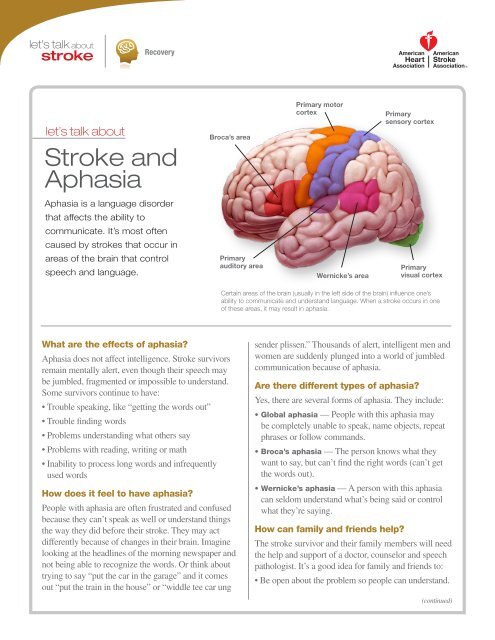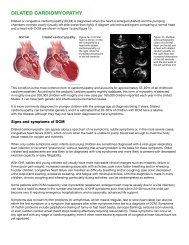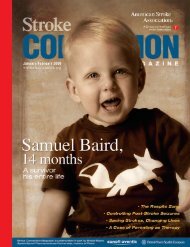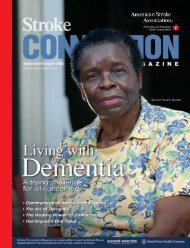Let's Talk About Stroke and Aphasia - American Stroke Association
Let's Talk About Stroke and Aphasia - American Stroke Association
Let's Talk About Stroke and Aphasia - American Stroke Association
You also want an ePaper? Increase the reach of your titles
YUMPU automatically turns print PDFs into web optimized ePapers that Google loves.
Recovery<br />
let’s talk about<br />
<strong>Stroke</strong> <strong>and</strong><br />
<strong>Aphasia</strong><br />
<strong>Aphasia</strong> is a language disorder<br />
that affects the ability to<br />
communicate. It’s most often<br />
caused by strokes that occur in<br />
areas of the brain that control<br />
speech <strong>and</strong> language.<br />
What are the effects of aphasia?<br />
<strong>Aphasia</strong> does not affect intelligence. <strong>Stroke</strong> survivors<br />
remain mentally alert, even though their speech may<br />
be jumbled, fragmented or impossible to underst<strong>and</strong>.<br />
Some survivors continue to have:<br />
• Trouble speaking, like “getting the words out”<br />
• Trouble finding words<br />
• Problems underst<strong>and</strong>ing what others say<br />
• Problems with reading, writing or math<br />
• Inability to process long words <strong>and</strong> infrequently<br />
used words<br />
Broca’s area<br />
How does it feel to have aphasia?<br />
People with aphasia are often frustrated <strong>and</strong> confused<br />
because they can’t speak as well or underst<strong>and</strong> things<br />
the way they did before their stroke. They may act<br />
differently because of changes in their brain. Imagine<br />
looking at the headlines of the morning newspaper <strong>and</strong><br />
not being able to recognize the words. Or think about<br />
trying to say “put the car in the garage” <strong>and</strong> it comes<br />
out “put the train in the house” or “widdle tee car ung<br />
Primary<br />
auditory area<br />
Primary motor<br />
cortex<br />
Wernicke’s area<br />
Primary<br />
sensory cortex<br />
Primary<br />
visual cortex<br />
Certain areas of the brain (usually in the left side of the brain) influence one’s<br />
ability to communicate <strong>and</strong> underst<strong>and</strong> language. When a stroke occurs in one<br />
of these areas, it may result in aphasia.<br />
sender plissen.” Thous<strong>and</strong>s of alert, intelligent men <strong>and</strong><br />
women are suddenly plunged into a world of jumbled<br />
communication because of aphasia.<br />
Are there different types of aphasia?<br />
Yes, there are several forms of aphasia. They include:<br />
• Global aphasia — People with this aphasia may<br />
be completely unable to speak, name objects, repeat<br />
phrases or follow comm<strong>and</strong>s.<br />
• Broca’s aphasia — The person knows what they<br />
want to say, but can’t find the right words (can’t get<br />
the words out).<br />
• Wernicke’s aphasia — A person with this aphasia<br />
can seldom underst<strong>and</strong> what’s being said or control<br />
what they’re saying.<br />
How can family <strong>and</strong> friends help?<br />
The stroke survivor <strong>and</strong> their family members will need<br />
the help <strong>and</strong> support of a doctor, counselor <strong>and</strong> speech<br />
pathologist. It’s a good idea for family <strong>and</strong> friends to:<br />
• Be open about the problem so people can underst<strong>and</strong>.<br />
(continued)
Recovery<br />
• Always assume that the stroke survivor can hear.<br />
Check underst<strong>and</strong>ing with yes/no questions.<br />
• Set up a daily routine for the person with aphasia that<br />
includes rest <strong>and</strong> time to practice skills.<br />
• Use sentences that are short <strong>and</strong> to the point.<br />
• Keep the noise level down <strong>and</strong> st<strong>and</strong> where the<br />
survivor can see you.<br />
• Remember to treat the stroke survivor as an adult<br />
<strong>and</strong> let him or her share in decision-making.<br />
No one likes to be ignored. Include the survivor in<br />
your conversation.<br />
• Help the stroke survivor cope with feelings of<br />
frustration <strong>and</strong> depression.<br />
• Be patient with the person with aphasia. Give them<br />
the time they need to try to speak <strong>and</strong> get their point<br />
across to you. This not only respects their dignity, but<br />
makes it less stressful for them when communicating.<br />
HOW CAN I LEARN MORE?<br />
<strong>Talk</strong> to your doctor, nurse or other<br />
healthcare professionals. Ask about<br />
other stroke topics.<br />
Call 1-888-4-STROKE (1-888-478-7653)<br />
or visit us at <strong>Stroke</strong><strong>Association</strong>.org to<br />
learn more about stroke.<br />
Call the <strong>American</strong> <strong>Stroke</strong> <strong>Association</strong>’s<br />
“Warmline” at 1-888-4-STROKE<br />
(1-888-478-7653), <strong>and</strong>:<br />
• Sign up for <strong>Stroke</strong> Connection, a free<br />
magazine for stroke survivors <strong>and</strong><br />
caregivers.<br />
• <strong>Talk</strong> to other stroke survivors <strong>and</strong><br />
caregivers <strong>and</strong> find local support groups.<br />
Do you have<br />
questions for the<br />
doctor or nurse?<br />
Take a few minutes to<br />
write your questions for<br />
the next time you see<br />
your healthcare provider.<br />
For example:<br />
How long will I need<br />
therapy?<br />
Will my aphasia go<br />
away?<br />
How can I find a<br />
stroke or aphasia<br />
support group?<br />
We have many other fact sheets to help you make healthier choices to reduce your risk, manage<br />
disease or care for a loved one. Visit strokeassociation.org/letstalkaboutstroke to learn more.<br />
Knowledge is power, so Learn <strong>and</strong> Live!<br />
<strong>Stroke</strong> <strong>and</strong> <strong>Aphasia</strong><br />
My Questions:<br />
©2012, <strong>American</strong> Heart <strong>Association</strong>







